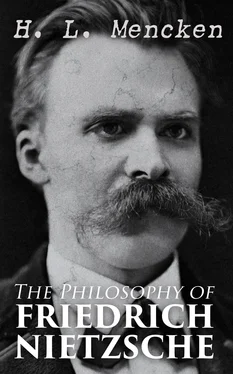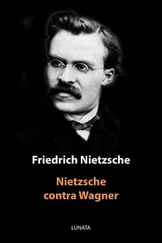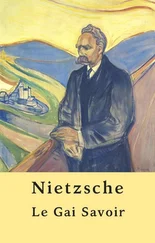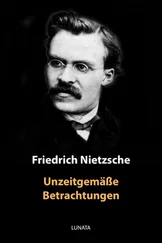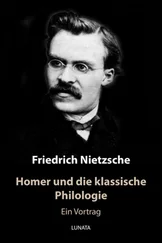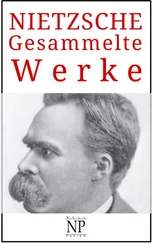"Strauss," he said, "utterly evades the question, What is the meaning of life? He had an opportunity to show courage, to turn his back upon the Philistines, and to boldly deduce a new morality from that constant warfare which destroys all but the fittest, but to do this would have required a love of truth infinitely higher than that which spends itself in violent invectives against parsons, miracles and the historical humbug of the resurrection. Strauss had no such courage. Had he worked out the Darwinian doctrine to its last decimal he would have had the Philistines against him to a man. As it is, they are with him. He has wasted his time in combatting Christianity's nonessentials. For the idea at the bottom of it he has proposed no substitute. In consequence, his philosophy is stale." 2
As a distinguished critic has pointed out, Nietzsche's attack was notable, not only for its keen analysis and ruthless honesty, but also for its courage. It required no little bravery, three years after Sedan, to tell the Germans that the new culture which constituted their pride was rotten, and that, unless it were purified in the fire of absolute truth, it might one day wreck their civilization.
In the year following Nietzsche returned to the attack with a criticism of history, which was then the fashionable science of the German universities, on account, chiefly, of its usefulness in exploding the myths of Christianity. He called his essay "Vom Nutzen und Nachtheil der Historie für das Leben " ("On the Good and Bad Effects of History upon Human Life") and in it he took issue with the reigning pedagogues and professors of the day. There was much hard thinking and no little good writing in this essay and it made its mark. The mere study of history, argued Nietzsche, unless some definite notion regarding the destiny of man were kept ever in mind, was misleading and confusing. There was great danger in assuming that everything which happened was part of some divine and mysterious plan for the ultimate attainment of perfection. As a matter of fact, many historical events were meaningless, and this was particularly true of those expressions of "governments, public opinion and majorities" which historians were prone to accentuate. To Nietzsche the ideas and doings of peoples seemed infinitely less important than the ideas and doings of exceptional individuals. To put it more simply, he believed that one man, Hannibal, was of vastly more importance to the world than all the other Carthaginians of his time taken together. Herein we have a reappearance of Dionysus and a foreshadowing of the herrenmoral and superman of later days.
Nietzsche's next essay was devoted to Schopenhauer and was printed in 1874. He called it " Schopenhauer als Erzieher " ("Schopenhauer as a Teacher") and in it he laid his burnt offering upon the altar of the great pessimist, who was destined to remain his hero, if no longer his god, until the end. Nietzsche was already beginning to read rebellious ideas of his own into "The World as Will and Idea," but in two things—the theory of will and the impulse toward truth—he and Schopenhauer were ever as one. He preached a holy war upon all those influences which had made the apostle of pessimism, in his life-time, an unheard outcast. He raged against the narrowness of university schools of philosophy and denounced all governmental interference in speculation—whether it were expressed crudely, by inquisitorial laws and the Index , or softly and insidiously, by the bribery of comfortable berths and public honors.
"Experience teaches us," he said, "that nothing stands so much in the way of developing great philosophers as the custom of supporting bad ones in state universities.... It is the popular theory that the posts given to the latter make them 'free' to do original work; as a matter of fact, the effect is quite the contrary.... No state would ever dare to patronize such men as Plato and Schopenhauer. And why? Because the state is always afraid of them.... It seems to me that there is need for a higher tribunal outside the universities to critically examine the doctrines they teach. As soon as philosophers are willing to resign their salaries, they will constitute such a tribunal. Without pay and without honors, it will be able to free itself from the prejudices of the age. Like Schopenhauer, it will be the judge of the so-called culture around it." 3
Years later Nietzsche denied that, in this essay, he committed himself irretrievably to the whole philosophy of Schopenhauer and a fair reading bears him out. He was not defending Schopenhauer's doctrine of renunciation, but merely asking that he be given a hearing. He was pleading the case of foes as well as of friends: all he asked was that the forum be opened to every man who had something new to say.
Nietzsche regarded Schopenhauer as a king among philosophers because he shook himself entirely free of the dominant thought of his time. In an age marked, beyond everything, by humanity's rising reliance upon human reason, he sought to show that reason was a puny offshoot of an irresistible natural law—the law of self-preservation. Nietzsche admired the man's courage and agreed with him in his insistence that this law was at the bottom of all sentient activity, but he was never a subscriber to Schopenhauer's surrender and despair. From the very start, indeed, he was a prophet of defiance, and herein his divergence from Schopenhauer was infinite. As his knowledge broadened and his scope widened, he expanded and developed his philosophy, and often he found it necessary to modify it in detail. But that he ever turned upon himself in fundamentals is untrue. Nietzsche at 40 and Nietzsche at 25 were essentially the same. The germ of practically all his writings lies in his first book—nay, it is to be found further back: in the wild speculations of his youth.
The fourth of the " Unzeitgemässe Betrachtungen " (and the last, for the original design of the series was not carried out) was "Richard Wagner in Bayreuth." 4This was published in 1876 and neither it nor the general subject of Nietzsche's relations with Wagner need be considered here. In a subsequent chapter the whole matter will be discussed. For the present, it is sufficient to say that Nietzsche met Wagner through the medium of Ritschl's wife; that they became fast friends; that Nietzsche hailed the composer as a hero sent to make the drama an epitome of the life unfettered and unbounded, of life defiant and joyful; that Wagner, after starting from the Schopenhauer base, travelled toward St. Francis rather than toward Dionysus, and that Nietzsche, after vain expostulations, read the author of "Parsifal" out of meeting and pronounced him anathema. It was all a case of misunderstanding. Wagner was an artist, and not a philosopher. Right or wrong, Christianity was beautiful, and as a thing of beauty it called aloud to him. To Nietzsche beauty seemed a mere phase of truth.
It was during this period of preliminary skirmishing that Nietzsche's ultimate philosophy began to formulate itself. He saw clearly that there was something radically wrong with the German culture of the day—that many things esteemed right and holy were, in reality, unspeakable, and that many things under the ban of church and state were far from wrong in themselves. He saw, too, that there had grown up a false logic and that its taint was upon the whole of contemporary thought. Men maintained propositions plainly erroneous and excused themselves by the plea that ideals were greater than actualities. The race was subscribing to one thing and practicing another. Christianity was official, but not a single real Christian was to be found in all Christendom. Thousands bowed down to men and ideas that they despised and denounced things that every sane man knew were necessary and inevitable. The result was a flavor of dishonesty and hypocrisy in all human affairs. In the abstract the laws—of the church, the state and society—were looked upon as impeccable, but every man, in so far as they bore upon him personally, tried his best to evade them.
Читать дальше
